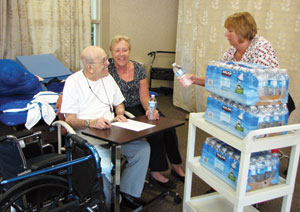 An errant raccoon in a Johnson County Water District No. 1 pumping station and the resulting water main break recently forced a boil order for most of the county just as the Independence holiday weekend was beginning. Among the 400,000 persons affected by the sudden unavailability of drinkable tap water were 228 residents at Village Shalom.
An errant raccoon in a Johnson County Water District No. 1 pumping station and the resulting water main break recently forced a boil order for most of the county just as the Independence holiday weekend was beginning. Among the 400,000 persons affected by the sudden unavailability of drinkable tap water were 228 residents at Village Shalom.
A situation of this nature can have an especially large impact on a facility like Village Shalom, a continuing-care retirement community that, like any other residence, relies on potable water for a variety of uses. Serving three meals daily to residents in its assisted living, skilled nursing and memory care areas, Village Shalom suddenly had to find other sources of clean water for lunch and dinner on Friday and for breakfast and lunch on Saturday.
“When I first heard about the warning, I immediately jumped into my car and headed to Costco, where I bought 20 cases of water,” said Sharon Lab, director of dining services. She also called the Village Shalom’s primary food supplier, Sysco, which has a standing agreement to provide additional stock in an emergency situation. Village Shalom’s driver picked up another 30 cases of water from Sysco’s warehouse.
Upon learning of the boil order, Village Shalom staff immediately notified all residents of the situation and promptly delivered bottled water to their apartments and rooms.
“Many of the residents had nothing in their rooms, so we tried to send them away from each meal with a lot of water,” said Lab. Residents and staff alike had access to plenty of fluids, including bulk supplies of bottled juice that Village Shalom regularly keeps on hand.
Food preparation required a slightly different approach than normal, Lab explained. All water used to wash fruit and vegetables, and to prepare lemonade and iced tea, first was boiled for at least two minutes.
“I didn’t notice anything different at meals,” remarked one resident about the staff’s response to the boil order. “Signs were posted in the hallways and in each of our rooms. They gave everyone water. Under the circumstances, they handled the situation extremely well.”
In addition to meals, other routines were adjusted to accommodate the tap-water hiatus.
“We had to remove all pitchers at residents’ bedsides and replace them with bottled water,” said Tina Munger, director of nursing. She added that medications were dispensed to residents with bottled water instead of the usual cup of water from a pitcher, and residents were advised to use bottled water for brushing their teeth. Each residential area of Village Shalom is prepared with an emergency kit stocked with non-perishable food items and cases of drinking water, should the need arise.
“We have a detailed policy in place in our emergency manual,” Munger noted, “so it was pretty easy to make it happen. Staff was very quick to respond to the situation, and we had plenty of water for everyone — staff as well as residents.”


